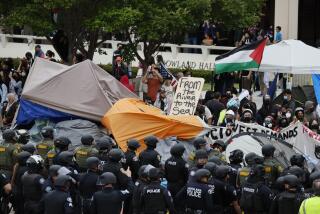After freshman’s death, San Diego State cracks down on fraternities and sororities
SAN DIEGO — San Diego State University is cracking down on its fraternities and sororities in the wake of the death of a freshman pledge and years of problems involving hazing and alcohol abuse.
President Adela de la Torre announced online Friday that five fraternities will not be allowed to recruit new members when spring rush begins this week. And she set new policies on how, when and where Greek organizations can recruit and socialize.
De la Torre adopted the recommendations made by a pair of task forces that she created on student safety and alcohol and substance abuse less than a week after the death of Dylan Hernandez.
Campus police said the 19-year-old freshman got heavily inebriated on Nov. 6 at an event hosted by Phi Gamma Delta, the house he was pledging. He later fell out of the top bunk bed at his dorm, suffering a blow to his head that killed him.
At the time of his death, 10 San Diego State fraternities, including Phi Gamma, were under investigation or suspension for various infractions.
De le Torre responded Friday by creating a Good Samaritan Policy that encourages student organizations and their members to notify the school and emergency personnel if a student has been “impacted” by alcohol or other drugs at a student activity.
The policy removes penalties for certain alcohol and drug violations.
De la Torre also tightened the rules under which fraternities and sororities are allowed to recruit members, limiting such activities to those that meet certain guidelines. Chapter recruitment and education events must take place between 9 a.m. and 9 p.m., according to the new policy.
The curfew is in response to “founded hazing violations,” according to a university memo detailing the new rules. The document doesn’t say what happened or who was involved, but it says it is aimed at the Interfraternity Council, or IFC for short, which represents 14 of the school’s fraternities.
The school said chapters also cannot host recruiting or new member education sessions at satellite houses, and that an advisor — faculty, staff or alumnus — must be present.
The new regulations and policies come five days after the Union-Tribune reported that Hernandez’s family is questioning the integrity of the investigation that campus police conducted into the student’s death.
According to the police report, Hernandez became inebriated during “Big/Little Night,” the moment a fraternity pledge learns who his mentor will be. A fraternity member guided Hernandez back to his dorm about midnight. He was led into his bunk bed but he fell out around 4:30 a.m. on Nov. 7, suffering blunt force trauma to his head when he hit the floor, according to the county Medical Examiner’s Office. He was pronounced dead the following day.
On Thursday, the medical examiner released an autopsy report showing Hernandez’s blood-alcohol content was 0.06%. But the police report estimates that his peak blood-alcohol level was about 0.23% when he left the Phi Gamma Delta party. That’s about three times the legal limit for operating a motor vehicle.
The autopsy also showed that Hernandez had marijuana in his system. It wasn’t possible to determine when he used the drug because it is known to linger in the body for weeks.
Campus police provided the Hernandez family with a copy of its initial investigation during the recent holidays. The family later shared it with the Union-Tribune and said that it does not appear that investigators did a thorough job of examining what happened during and after the party.
The report suggests that campus police did not interview anybody from the Phi Gamma Delta fraternity, including about a dozen specific members who likely attended and had videos or images from the party. Two videos appear to show hazing, including a young man being struck with a paddle.
As the Union-Tribune reported last Sunday, the report also indicates that the police department chose not to pursue search warrants to review cellphone records and social media records of students, despite possessing chat messages between suspected fraternity members instructing one another to delete possibly incriminating material and to stay quiet. “Remember silence is golden,” one member wrote.
Campus police said in a follow-up statement that the report provided to the family was incomplete. Investigators said they gave the family the document “in an effort to be as supportive and transparent with the family as possible during a difficult time for them as they are mourning the tragic loss of their loved one.”
The department added that details contained in the report were not meant to be shared with the public since that information could compromise the investigation and hinder witnesses from coming forward. The department also said the report could contribute to “inaccurate reporting and assumptions that erode the integrity and approach of the investigation...”
Police said they have identified essential witnesses and are continuing to investigate and gather information.
The two task forces — The Presidential Task Force on Student Activities and Safety and The Presidential Task Force on Alcohol and Substance Misuse — are expected to produce full reports on their recommendations and findings in April and July.
De la Torre said she was planning on having the task forces hold some public hearings, although so far the discussions have been held in private.
Robbins and Winkley write for the San Diego Union-Tribune
More to Read
Sign up for Essential California
The most important California stories and recommendations in your inbox every morning.
You may occasionally receive promotional content from the Los Angeles Times.










